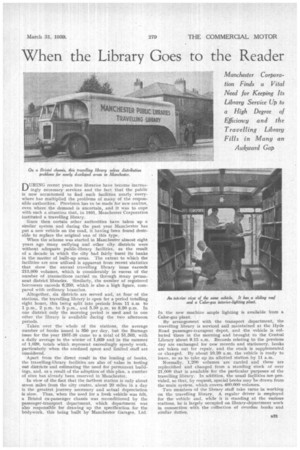When the Library Goes to the Reader
Page 109

If you've noticed an error in this article please click here to report it so we can fix it.
DURING recent years free libraries have become increasingly necessary services and the fact that the public is now accustomed to find such facilities nearly everywhere has multiplied the problems of many of the responsible authorities. Provision has to be made for new centres, even where the demand is uncertain, and it was to cope with such a situation that, in 1931, Manchester Corporation instituted a travelling library.
Since then certain other authorities have taken up a similar system and during the past year Manchester has put a new vehicle on the road, it having been found desirable to replace the original van of this type.
When the scheme was started in Manchester almost eight years ago many outlying and other city districts were without adequate public-library facilities, as the result of a decade in which the city had fairly burst its banks in the matter of built-up areas. The extent to which the facilities are now utilized is apparent from recent statistics that show the annual travelling library issue exceeds 213,000 volumes, which is considerably in excess of the number of transactions carried on through many permanent district libraries. Similarly, the number of registered borrowers exceeds 8,250, which is also a high figure, compared with ordinary branches.
Altogether, six districts are served and, at four of the stations, the travelling library is open for a period totalling eight hours, this being split intO periods from 11 a.rn to 1 p.m., 2 p.m. to 5 p.m., and 5.30 p.m. to 8.30 p.m. In one district only the morning period is used and in one other the library is available during the two afternoon periods.
Taken over the whole of the stations, the average number of hooks issued is 850 per day, but the Burnage issue for the year 1931-38 came to a total of 51,503, with a daily average in the winter of 1,039 and in the summer of 1,020, totals which represent exceedingly speedy work, particularly when the confined space and limited staff are considered.
Apart from the direct result in the lending of books, the travelling-library facilities are also of value in testing out districts and estimating the need for permanent buildings, and, as a result of the adoption of this plan, a number of sites has already been reserved in Manchester.
In view of the fact that the farthest station is only about seven miles from the city centre, about 20 miles in a day is the greatest journey necessary and actual depreciation is slow. Thus, when the need for a fresh vehicle was felt, a Bristol ex-passenger chassis was reconditioned by the passenger-transport department, which department was also responsible for drawing up the specification for the bodywork, this being built by Manchester Garages, Ltd. In the new machine ample lighting is available from a Calor-gas plant. By arrangement with the transport department, the travelling library is serviced and maintained at the Hyde Road passenger-transport depot, and the vehicle is collected there in the morning and brought to the Central Library about 9.15 a.m. Records relating to the previous day are exchanged for new records and stationery, books are taken out for repair, and the stock is supplemented or changed. By about 10.30 a.m. the vehicle is ready to leave, so as to take up its allotted station by 11 a.m.
Normally, 1,200 volumes are carried and these are replenished and changed from a standing stock of over 21,000 that is available for the particular purposes of the travelling library. In addition, the usual facilities are provided, Sc, that, by request, special books may le drawn from the main system, which covers 400,000 volumes. Two members of the library staff take turns in working on the travelling library, A regular driver is employed for the vehicle and, while it is standing at the various stations, he is largely occupied on library-department work in connection with the collection of overdue books and similar duties,
























































































































































